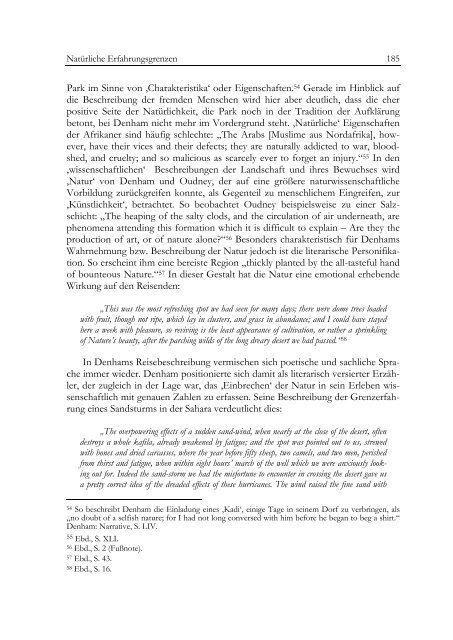Natur als Grenzerfahrung - Oapen
Natur als Grenzerfahrung - Oapen
Natur als Grenzerfahrung - Oapen
Sie wollen auch ein ePaper? Erhöhen Sie die Reichweite Ihrer Titel.
YUMPU macht aus Druck-PDFs automatisch weboptimierte ePaper, die Google liebt.
Natürliche Erfahrungsgrenzen<br />
Park im Sinne von ‚Charakteristika‘ oder Eigenschaften. 54 Gerade im Hinblick auf<br />
die Beschreibung der fremden Menschen wird hier aber deutlich, dass die eher<br />
positive Seite der Natürlichkeit, die Park noch in der Tradition der Aufklärung<br />
betont, bei Denham nicht mehr im Vordergrund steht. ‚Natürliche‘ Eigenschaften<br />
der Afrikaner sind häufig schlechte: „The Arabs [Muslime aus Nordafrika], however,<br />
have their vices and their defects; they are naturally addicted to war, bloodshed,<br />
and cruelty; and so malicious as scarcely ever to forget an injury.“ 55 In den<br />
‚wissenschaftlichen‘ Beschreibungen der Landschaft und ihres Bewuchses wird<br />
‚<strong>Natur</strong>‘ von Denham und Oudney, der auf eine größere naturwissenschaftliche<br />
Vorbildung zurückgreifen konnte, <strong>als</strong> Gegenteil zu menschlichem Eingreifen, zur<br />
‚Künstlichkeit‘, betrachtet. So beobachtet Oudney beispielsweise zu einer Salzschicht:<br />
„The heaping of the salty clods, and the circulation of air underneath, are<br />
phenomena attending this formation which it is difficult to explain – Are they the<br />
production of art, or of nature alone?“ 56 Besonders charakteristisch für Denhams<br />
Wahrnehmung bzw. Beschreibung der <strong>Natur</strong> jedoch ist die literarische Personifikation.<br />
So erscheint ihm eine bereiste Region „thickly planted by the all-tasteful hand<br />
of bounteous <strong>Natur</strong>e.“ 57 In dieser Gestalt hat die <strong>Natur</strong> eine emotional erhebende<br />
Wirkung auf den Reisenden:<br />
„This was the most refreshing spot we had seen for many days; there were dome trees loaded<br />
with fruit, though not ripe, which lay in clusters, and grass in abundance; and I could have stayed<br />
here a week with pleasure, so reviving is the least appearance of cultivation, or rather a sprinkling<br />
of <strong>Natur</strong>e’s beauty, after the parching wilds of the long dreary desert we had passed.“ 58<br />
In Denhams Reisebeschreibung vermischen sich poetische und sachliche Sprache<br />
immer wieder. Denham positionierte sich damit <strong>als</strong> literarisch versierter Erzähler,<br />
der zugleich in der Lage war, das ‚Einbrechen‘ der <strong>Natur</strong> in sein Erleben wissenschaftlich<br />
mit genauen Zahlen zu erfassen. Seine Beschreibung der <strong>Grenzerfahrung</strong><br />
eines Sandsturms in der Sahara verdeutlicht dies:<br />
„The overpowering effects of a sudden sand-wind, when nearly at the close of the desert, often<br />
destroys a whole kafila, already weakened by fatigue; and the spot was pointed out to us, strewed<br />
with bones and dried carcasses, where the year before fifty sheep, two camels, and two men, perished<br />
from thirst and fatigue, when within eight hours’ march of the well which we were anxiously looking<br />
out for. Indeed the sand-storm we had the misfortune to encounter in crossing the desert gave us<br />
a pretty correct idea of the dreaded effects of these hurricanes. The wind raised the fine sand with<br />
54 So beschreibt Denham die Einladung eines ‚Kadi‘, einige Tage in seinem Dorf zu verbringen, <strong>als</strong><br />
„no doubt of a selfish nature; for I had not long conversed with him before he began to beg a shirt.“<br />
Denham: Narrative, S. LIV.<br />
55 Ebd., S. XLI.<br />
56 Ebd., S. 2 (Fußnote).<br />
57 Ebd., S. 43.<br />
58 Ebd., S. 16.<br />
185

















